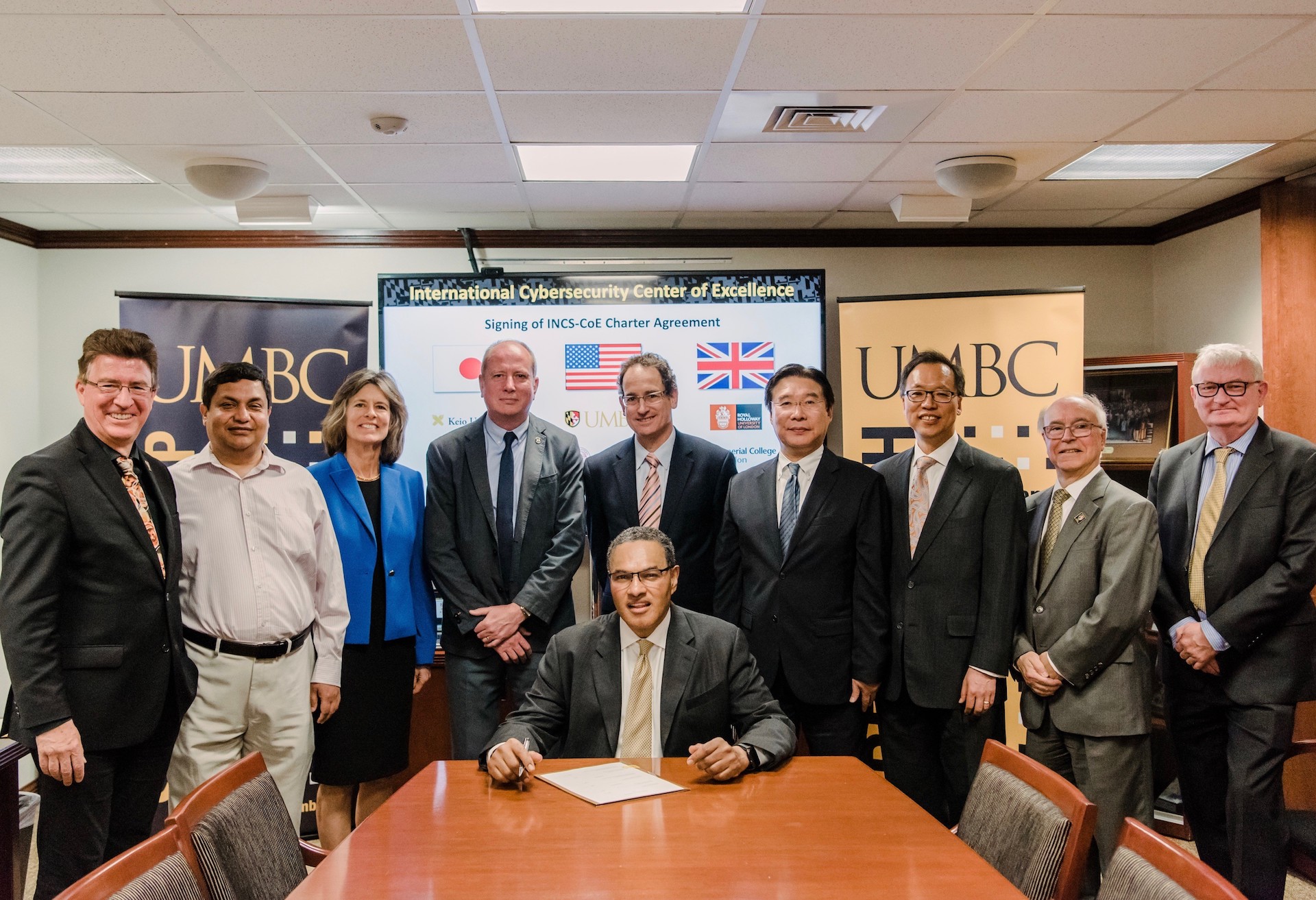What is INCS-CoE?
INCS-CoE started as an umbrella organisation, facilitating to generate individual projects, providing the value for the government-industry-academia where one organisation nor one country can accomplish the cybersecurity goals of international collaborating each other. Main pillars of the activities are: 1) Research, 2) Policy, and 3) Education and Training: “Tiger Teams” can drive creating the individual projects to address internationally pressing issues.
The outcomes of the activities will be international joint research projects and the best practices, publishing white papers and statements, and creating student competition such as Capture the Flag (CTF), exchanging students and faculty members, and generate more international degrees and certificates, funded by joint government schemes and industry contributions. Also, the outcomes are shared with Working Group meetings and International Symposia.
The INCS-CoE Charter
Members are:

United States
UMBC
Northeastern University

United Kingdom
Imperial College London
Royal Holloway University of London

Japan
Keio University
Kyushu University
INCS-CoE is actively working with numerous other Universities across the globe to join the INCS-CoE either as Core Members from the original Member Nations or as Affiliate Members from other Nations.
We are passionate about our work and inspired by our team
Core Universities

Keio University
• Distributed Security Operation Center Technologies
• Development of Trusted Identity
• Development of Education Curriculum for Cyber

Kyushu University
• Security in the IOT Space
• Next Generation and Future networks
• Society 5.0
• International collaboration for Cybersecurity
• International Cybersecurity Workshops

UMBC
• Mobile Systems & Device/Endpoint Security
• Policy-based, Context-aware Access Control
• Security and Privacy for IoT/E, Mobile, Cloud Environments
• Big Data/Analytics for Security, incl. Privacy-preserving Analytics
• Economic Risk Analysis for Cyber Attacks
• Public Policy Issues
• Interdepartmental Research Institute
• Designated by NSA and DHS as Center of Academic Excellence for Resercah and for Education
• Secure Voting
• Trustworthy Computing
• Digital Forensics
• Cryptology
• Cyber Analytics
• IoT/IoE; Scientific Datasets
• Quantum Analytics
• Cloud Computing and Data Privacy

Northeastern University
• Expeditionary Cyber; Data Analytics; Geographic Info Systems
• Tactical Edge Cyber: Manufacturing; Autonomous Systems
• Colosseum RF Emulator
• Wi-Fi – Resilience against smart and cascading network attacks
• Software Defined Infrastructure
• Institute for Information Assurance
• Institute for the Wireless Internet of Things
• Network Science Institute

Imperial College London
• Critical Infrastructure
• Biosecurity
• Nuclear Security
• Financial Systems
• Environmental Security
• Healthcare and Medical Devices
• Protection of Critical National Infrastructure
• Risk Communication
• Novel Mitigations
• Socio-technical Aspects

Royal Holloway University of London
• UK Academic Centre of Excellence in Cyber Security Research, with long history of working responsibly with industry and government.
• Large specialist team; with wide range of cyber security research
• Cryptography, including Post-Quantum
• Communications, Network, IT, Cloud and Computer Security
• Hardware, Cyber-Physical and Critical infrastructure Security
• Cyber Crime, Legal, Regulatory Aspects
• Security Management and Standards
• Human Factors, Social and Psychology Security
• Hosts a UK Centre for Doctoral Training in Cyber Security
• Hosts the Smart Card and IoT Security Centre (SCC); founded 2002
• Hosts the System and Software Security Lab (S3Lab); founded 2014




Leadership
INCS-CoE Expert Community
History
Keio University announced on November 1st, 2016 to launch the world’s first InterNational Cyber Security Center of Excellence (INCS-CoE) with U.S., UK, and Japanese universities. For the inauguration period, Professor Jun Murai became the Chair. It started as loosely coupled umbrella organization by the initial members kicked off, including Keio University, Stanford University, Northeastern University, Imperial College London, University of Oxford, University of Cambridge, the University of Tokyo, Waseda University, Tokyo Denki University, and Institute of Information Security (IISEC).
INCS-CoE is the backbone of International Cybersecurity Symposia series at Keio University, which completed the 9th Symposium on December 11-12, 2019.
There are 25 international leading cybersecurity related universities in the U.S., UK, Japan, and expending to Israel, Indonesia, and further Australia during the course of expansion in the last 3 years.
July 2019, new INCS-CoE Charter was ratified internationally by the 6 U.S., UK, and Japanese university Presidents to govern the international activities and projects by more formalized manner for globally sustainable organization. It is strengthening the core of the organization rooted deeper while expanding wider to the cybersecurity community of the world.
